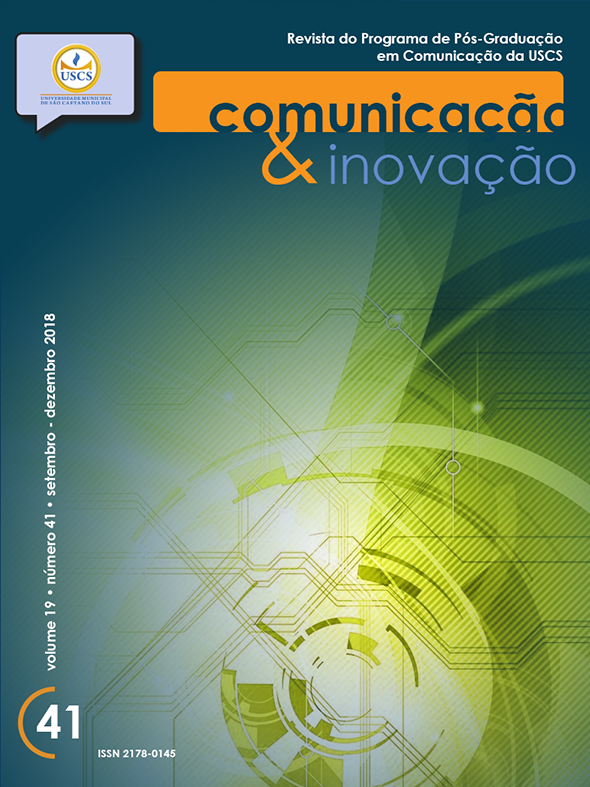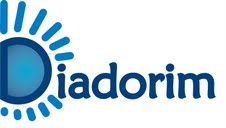Comunicação Política e educação: desenvolvimento de capacidades deliberativas entre jovens da rede pública de ensino no Brasil
DOI:
https://doi.org/10.13037/ci.vol19n41.5520Keywords:
deliberação, escolas, comunicação política, democracia, conflitoAbstract
Este artigo explora experiências internacionais que envolvem a prática da deliberação em escolas e apresenta os passos da primeira experiência voltada para a aprendizagem e o treinamento de capacidades deliberativas no Brasil. Fundamentadas nas teorias da democracia deliberativa, tais iniciativas são primordialmente interdisciplinares, ao estabelecer interfaces com estudos nos campos da Comunicação, Ciência Política e Educação, entre outras áreas. Este artigo busca contribuir com pesquisas comunicacionais que visam à intervenção social no que tange à resolução de conflitos, modelos de discussão colaborativa e convivência democrática no âmbito escolar.
Downloads
References
ABRAMOVAY, M.; AVACINI, M.; OLIVEIRA, H. O bê-á-bá da intolerância e da discriminação.
Brasília, DF: Unicef, 2002. Disponível em: <http://www.unicef.org/brazil/pt/Cap_02.pdf>.
Acesso em: 20 outubro 2016
AVERY, P. G.; LEVY, S. A.; SIMMONS, A. M. M. Deliberating Controversial Public Issues as
Part of Civic Education. The Social Studies, n. 104, p. 105-114, 2013. DOI: https://doi.org/10.1080/00377996.2012.691571
BÄCHTIGER, A.; WEGMANN, A. Scaling up deliberation. In: ELSTUB, S.; MCLAVERTY, P.
(Eds.). Deliberative democracy: Issues and cases. Edinburgh, UK: Edinburgh University Press,
2014. Pp. 118-135.
BORMANN, E. G. Symbolic convergence theory and communication in group decision making.
In: Hirokawa, R.Y.; POOLE, M. S. (Org.) Communication and group decision-making. 2.ed.
Beverly Hills, CA: Sage, 1996. Pp. 81-113.
COLEMAN, S.; MOSS, G. Under construction: The field of online deliberation research. Journal
of Information Technology & Politics, 9(1), 1-15, 2012. DOI: https://doi.org/10.1080/19331681.2011.635957
DAYRELL, J; NOGUEIRA, M.A; VIEIRA, M.M.; RESENDE, J (Org.). Habitar escolas e suas
margens. Portalegre, Portugal: Instituto Politécnico de Portalegre, 2012.
DENT, C. W.; GALAIF, J.; SUSSMAN, S.; STACY, A.; BURTUN, D.; FLAY, B. R. Demographic,
psychosocial and behavioral differences in samples of actively and passively consented
adolescents. Addictive Behaviors, v. 18, n. 1, p. 51-56, 1993. DOI: https://doi.org/10.1016/0306-4603(93)90008-W
DRYZEK, J. S. Foundations and Frontiers of Deliberative Governance. Oxford: Oxford University
Press, 2010.
DRYZEK, J. S. Theory, Evidence, and the Tasks of Deliberation. In: ROSENBERG, S. (Ed.).
Deliberation, participation and democracy: can the people govern? New York: Palgrave Mac-
Millan, 2007. Pp. 237-250.
164 Comunicação & Inovação, PPGCOM/USCS
v.19, n. 41 [149-166] set-dez 2018
Comunicação Política e educação
DRYZEK, J. S; HENDRIKS, C. (2012). Fostering deliberation in the forum and beyond. In: DOI: https://doi.org/10.1215/9780822395362-002
FISCHER, F; GOTTWEIS, H. (eds.), The Argumentative Turn Revisited: Public Policy as
Communicative Practice (Kindle location 564 of 8327). Duke University Press. Kindle Edition.
FELDMAN, L.; PASEK, J.; ROMER, D.; JAMIESON, K. Identifying Best Practices in Civic
Education: Lessons from the Student Voices Program. American Journal of Education, v. 114,
n. 1, p. 75-100, 2007. DOI: https://doi.org/10.5796/electrochemistry.75.100
FISHKIN, J. S. The voice of the people. New Haven, CT: Yale University Press, 1995.
GARCIA, L.; CAL, D.; MORAES, C (2017) Marcações de gênero no espaço escolar e a percepção
das meninas. In: SANTOS, B.; FREITAS, L. (Orgs). Ser Menina no Brasil Contemporâneo:
marcações de gênero em contexto de desigualdades. Curitiba: CRV, 2017, p. 81-100.
GASTIL, J.; DILLARD, J. P. The aims, methods, and effects of deliberative civic education
through the National Issues Forums. Communication Education, v. 48, jul. 1999.
GERSHTENSON, Joseph; RAINEY JR, Glenn W.; RAINEY, Jane G. Creating better citizens?
Effects of a model citizens' assembly on student political attitudes and behavior. Journal of Political
Science Education, v. 6, n. 2, p. 95-116, 2010. DOI: https://doi.org/10.1080/15512161003708129
GIORDAN, M. The role of IRF exchanges in the discursive dynamics of email tutored interactions.
International Journal of Educational Research, v. 39, p. 817-827, 2003. DOI: https://doi.org/10.1016/j.ijer.2004.11.004
HOLT, M.; KLEIBER, P.; SWENSON, J. Facilitating Group Learning on the Internet. New Directions
for Adult and Continuing Education, n. 78, p. 43-51, 1998. DOI: https://doi.org/10.1002/ace.7805
JARAMILLO, M. C.; STEINER, J. Deliberative transformative moments. A new concept as
amendment to the DQI. Journal of Public Deliberation, v. 10, n. 2, 2014.
KIES, R. Promises and limits of web-deliberation. London, UK: Palgrave Macmillan, 2010. DOI: https://doi.org/10.1057/9780230106376
KIES, R.; MANZ, P. (ed.). Is Europe listening to us? Success and failures of EU citizens consultations.
Surrey, UK: Asgate, 2013.
MANSBRIDGE, J.; BOHMAN, J.; CHAMBERS, S.; CHRISTIANO, T.; FUNG, A.; PARKINSON,
J.; WARREN, M. E. A systemic approach to deliberative democracy. In: PARKINSON, J; MANSBRIDGE,
J. (Eds.). Deliberative systems. Cambridge, MA: Cambridge University Press, 2012. Pp. 1-26.
165 Comunicação & Inovação, PPGCOM/USCS
v.19, n. 41 [149-166] set-dez 2018
Érica A. Baptista, Fernanda N. Sanglard, Danila G. Cal, Ana C. Vimieiro, Rousiley C. Maia & Vanessa O. Veiga
NEBLO, M. A. Deliberative democracy between theory and practice. Cambridge, MA: Cambridge
University Press, 2015.
NIEMEYER, S. Scaling up deliberation to mass publics: Harnessing mini-publics in a deliberative
system. In K. Grönlund, A. Bächtinger & M. Setälä (Eds.), Deliberative mini-publics:
Involving citizens in the democratic process. Colchester, UK: ECPR Press, 2014. Pp. 177-202.
O'CONNELL, D. W.; MCKENZIE, R. H. Teaching the Art of Public Deliberation—National
Issues Forums in the Classroom 1. PS: Political Science & Politics, v. 28, n. 2, p. 230-232, 1995. DOI: https://doi.org/10.2307/420352
PARKINSON, J. Deliberating in the real world - Problems of legitimacy in deliberative democracy.
Oxford: Oxford University Press, 2006.
PEREIRA, A. C. S.; DE ALBUQUERQUE WILLIAMS, L. C., DE BEM, F. P. Consentimento dos pais
em pesquisas com escolares e a legislação brasileira. Interação em Psicologia, v. 16, n. 1, p. 51-61, 2012.
SAMUELSSON, M.; BOYUM, S. Education for deliberative democracy: Mapping the field. Utbildning
& Democrakti, v. 24, n. 1, p.75-94, 2015. DOI: https://doi.org/10.48059/uod.v24i1.1031
STASAVAGE, D. Polarization and publicity: Rethinking the benefits of deliberative democracy.
Journal of Politics, v. 69, n. 1, p. 59-72, 2007. DOI: https://doi.org/10.1111/j.1468-2508.2007.00494.x
STEINER, J., BÄCHTIGER, A., SPÖRNDLI, M., STEENBERGEN, M. R. Deliberative politics
in action: analyzing parliamentary discourse. Cambridge: Cambridge University Press, 2004.
STEINER, J.; JARAMILLO, M. C.; MAIA, R. C. M.; MAMELI, S. Deliberation across deep
divisions: Transformative moments. Cambridge: Cambridge University Press, 2017.
STEVENSON, H.; DRYZEK, J. S. Democratizing global climate governance. Cambridge, UK:
Cambridge University Press, 2014.
STRANDBERG, K; GRÖNLUND, K. Online deliberation: Theory and practice in virtual mini-
-publics. In: GRÖNLUND, K; BÄCHTINGER, A; SETÄLÄ, M (eds.), Deliberative mini-publics:
involving citizens in the democratic processes. Colchester, UK: ECPR Press, 2014, p. 93-113.
STROMER-GALLEY, J.; WICHOWSKI, A. Political discussion online. In: CONSALVO, M;
ESS, C; BURNETT, R (Eds.), Blackwell handbook of internet studies. London, UK: Blackwell,
2011. Pp 168-187.
166 Comunicação & Inovação, PPGCOM/USCS
v.19, n. 41 [149-166] set-dez 2018
Comunicação Política e educação
TESTA, A. C.; & COLEMAN, L. M. Accessing research participants in schools: a case study of
a UK adolescent sexual health survey. Health education research, v. 21, n. 4, p. 518-526, 2006. DOI: https://doi.org/10.1093/her/cyh078
THOMPSON, D. F. Deliberative democratic theory and empirical political science. Annual Review
of Political Science, n.11, p. 497-520, 2008. DOI: https://doi.org/10.1146/annurev.polisci.11.081306.070555
THORNBERG, R. School democratic meetings: Pupil control discourse in disguise. Teaching
and Teacher Education, n. 26, p. 924-932, 2010. DOI: https://doi.org/10.1016/j.tate.2009.10.033
UNGER, J. B.; GALLAHER, P.; PALMER, P. H.; BAEZCONDE-GARBANATI, L.; TRINIDAD,
D. R.; CEN, S.; JOHNSON, C. A. No news is bad news: Characteristics of adolescents who
provide neither parental consent nor refusal for participation in school-based survey research.
Evaluation Review, v. 28, n. 1, p. 52-63, 2004. DOI: https://doi.org/10.1177/0193841X03254421
WARREN, M.E.; PEARSE, H. Designing deliberative democracy: The British Columbia Citizens'Assembly.
Cambridge: Cambridge University Press, 2008.
Downloads
Published
Issue
Section
License
Copyright (c) 2018 Érica Anita Baptista, Fernanda Nalon Sanglard, Danila Gentil Cal, Ana Carolina Vimieiro, Rousiley Celi Moreira Maia, Vanessa Oliveira Veiga

This work is licensed under a Creative Commons Attribution-NonCommercial-NoDerivatives 4.0 International License.
Conforme consta nas normas da revista, o envio de artigos e textos solicitando a apreciação com a finalidade de publicação na Comunicação & Inovação, configura a cessão de direitos autorais.
No caso de fotos e imagens, o autor deve providenciar documento que ateste a permissão em termos de direitos autorais.





